新目标八年级英语上册第一单元知识点
人教版新目标八年级英语上册1、2、3、4单元知识点总结材料

新目标八年级英语上册第一单元Unit 1.How often do you exercise?I. 重点短语归纳:on weekends 在周末1. go to the movies 去看电影2. look after=take care of 照顾、照看3. surf the internet 上网4. healthy lifestyle 健康的生活方式5. go skateboarding 去滑滑板watch TV看电视6. keep healthy=stay healthy = keep in good health 保持健康keep + 形容词表保持某种状态do some reading 阅读7. exercise= take/do (much) exercise=do sports锻炼8. eating habits 饮食习惯9. take more exercise 做更多的运动10. the same as 与什么相同11. once a month一月一次12. be different from 不同13. twice a week一周两次.three times a week一周三次14. make a difference to 对什么有影响As teachers, you must believe that you can make a difference to the li ves of your students. 身为教师,你们必须坚信你们能够影响学生的一生。
A false step will make a great difference to my future.错走一步对我的前程来说会产生很大影响。
15.how often 多久一次,询问动作发生的频率一般用once a week ,twice a month ,every day ,sometimes等回答。
人教新目标英语八年级上册Unit1单元知识点讲义

人教新目标英语八年级上册Unit 1 单元知识点讲义1.复合不定代词:指人: someone anyone no one everyone某人某人,任何人没有人每人somebody anybody nobody everybody指物:something anything nothing everything某物某物,任何事物没有东西每件事物1) 复合不定代词做主语,谓语动词用单三.Ex. Someone is waiting for you at the door.Nobody knows the answer to the question .2) some…一般用于肯定句中,any…一般用于否定句和疑问句中.Ex. There is something in the room .There isn’t anything in the room .Is there anything in the room ?I have something to do today .I don’t have anything to do today .There is someone outside the door .There isn’t anyone outside the door.Is there anyone outside the door ?3) 在表示邀请,请求,建议希望得到对方肯定回答时,用some… , 不用any…Would you like something to drink / eat ?4) 肯定句中anything 表示任何事物, anyone = anybody 任何人Ex. Anything is OK.I can do anything for you .Anybody knows the answer.5) 形容词或to do 形式修饰复合不定代词时要后置.Ex. There is nothing wrong with my car.I have something important to tell you .There isn’t anything interesting here .Do you want something to drink / eat ?6) not everybody / everyone / everything 表示部分否定,意为‘并非都…’Ex. Not everyone likes singing .Not everything goes well .not any …和no…表示全部否定Ex. He listened ,but heard nothing .He listened ,but didn’t hear anything .not anything = nothing not anyone/ body = no one / nobodyEx. There is nothing in the bottle . = There isn’t anything in the bottle.7) no one 指人,回答Who 提问, no one of … / nobody 不能加ofnothing 指物, 不能加of none 指人或物,回答Is there …? 提问none of …Ex. Who is in the room ? No one .Is there anyone in the room ? None .2.表地点复合不定副词:somewhere anywhere某地,肯定句中某地,否定句和疑问句中/ 任何地方,肯定句中nowhere everywhere没有地方到处,每个地方, 用于肯定句中Ex. I want to go somewhere interesting .3.wonderful adj. 精彩的Ex. We had a wonderful time on the beach .It is such a wonderful film that we all enjoy it .who…wonder v. 想知道what…引导的宾语从句,用陈述句语序why…Ex. I wonder who the boy is . = I want to know who the boy is .I wonder what they are doing . =I want to know what they are doing .wonder +特殊疑问词+ to doEx. I wonder what to do . = I want to know what to do . = I wonder what I should do.I wonder where to go . / I wonder how to do that .4、几乎没有few 后接可数名词复数(否)little 后接不可数名词肯 a few 有一些,后加可数名词复数quite a few 相当多,不少a little 有点,后加不可数名词quite a little相当多,不少only a few 只有一点only a littlevery few 非常少very littleEx. I have a few friends. 肯I have few friends . 否I have quite a few friends .a little 修饰adj. = kind of= a little bit5. most of the time 大部分时间most of the foodmost of us/themmost of + n. = most +n.Ex. Most of the students like English . = Most students like English .6. Of course . = Sure. = Certainly . 当然.7. 反身代词第一人称:myself ourselves 我们自己第二人称:yourself 你自己yourselves 你们自己第三人称:himself 他自己herself 她自己itself 它自己themselves 他们自己8. seem 似乎,好像1) seem to be +形容词/名词= seem + 形容词/名词似乎…Ex. That seems to be her mother . = That seems her mother .It seems to be too difficult . = It seems too difficult.2) seem to do sthHe seems to have a cold.3) It seems that + 从句.It seems that he is happy. = He seems to be happy . = He seems happy.9. adj. bored 感到无聊的修饰人boring 令人厌烦的修饰事或物I feel bored , because the movie is boring.be bored with …对…感到无聊Ex. I’m bored with the boring movie.10. keep / write a diary = keep /write diaries 记日记(keep优先使用)11. activity n. 活动activities 复数Ex. What activities did you find interesting ?12. decide 决定1) decide to do sth. 决定做某事= make a decision to do sth = make one’s mind doing sthThey decide to visit the museum.decide not to do sth 决定不要做某事decide + 疑问词+动词不定式He can not decide when to leave.2) decide + 宾语从句(陈述句语序)He can’t decide when he leaves .I can’t decide where I should go. 改为同义句I can’t decide where to go.13. try to do sth. 努力尽力去做某事Ex. You must try to pass the exam.try doing sth. 试着做某事Ex. He tried making a model plane.try one’s best to do sth = do one’s best to do sth 尽最大努力做某事Ex. You should try your best to learn English well .have a try 试一试try on 试穿Ex. Let me have a try .14. feel like1)给……的感觉,后接从句He feels like he is swimming.I felt like I was a bird.2) feel like 想要后接名词/代词/doing sthfeel like doing sth = want to do sth =would like to do sth想要做某事Do you feel like taking a walk with me ?Do you want to take a walk with me ?3) feel + 形容词, 感到…I feel bored .look +adj. sound+adj. feel +adj.look like +n. sound like+n. feel like +n.15.look 看起来taste 尝起来be( was were is am are)sound 听起来feel 感觉摸起来系动词+adj.smell 闻起来seem 似乎16. build v. 建筑n. 体格of medium build 中等身材building n. 建筑物,大楼builder n. 建筑师16.difference n. 不同点-----differences n. 复数different adj. 不同的be different from …不同于… = not the same as…Ex. 1) Chinese names are different from English names. = Chinese names aren’t the same as English names .2) I’m different from you . = I’m not the same as you .3) I can’t see the differences between the buses in the picture.n. 不同之处17. on the top of the hill在山顶, 面at the top of the hill 在山顶, 点(最高点)at the foot of the hill在山脚下walk up to the hill top 径直走向山顶come top 登顶,得第一Ex. He always comes top every exam.18. wait for + 人或物wait 不及物动词,连接forEx. I’ll wait for you at the door.He waited over an hour for the train . ( He waited for the train over an hour. )can’t wait to do sth 迫不及待做某事Ex. The wonderful vacation , I can’t wait .19. because + 从句because of + n./ pron./ doingBecause the weather was bad, we couldn’t see anything below.Because of the bad weather, we could n’t see anything below.20. enough 1) adj足够的,修饰名词做定语We have enough time to do our homework.I have enough money .2) adv.足够地,充分地,用来修饰形容词或副词,一般置于被修饰词之后I know him well enough.我足够了解他。
新目标英语8年级上册1-5单元知识点
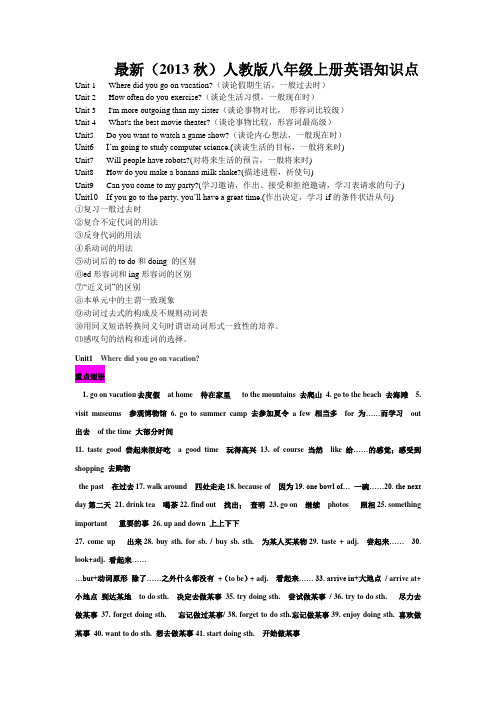
最新(2013秋)人教版八年级上册英语知识点Unit 1 Where did you go on vacation?(谈论假期生活,一般过去时)Unit 2 How often do you exercise?(谈论生活习惯,一般现在时)Unit 3 I'm more outgoing than my sister(谈论事物对比,形容词比较级)Unit 4 What's the best movie theater?(谈论事物比较,形容词最高级)Unit5 Do you want to watch a game show?(谈论内心想法,一般现在时)Unit6 I’m going to study computer science.(谈谈生活的目标,一般将来时)Unit7 Will people have robots?(对将来生活的预言,一般将来时)Unit8 How do you make a banana milk shake?(描述进程,祈使句)Unit9 Can you come to my party?(学习邀请,作出、接受和拒绝邀请,学习表请求的句子) Unit10 If you go to the party, you’ll have a great time.(作出决定,学习if的条件状语从句)①复习一般过去时②复合不定代词的用法③反身代词的用法④系动词的用法⑤动词后的to do和doing 的区别⑥ed形容词和ing形容词的区别⑦“近义词”的区别⑧本单元中的主谓一致现象⑨动词过去式的构成及不规则动词表⑩用同义短语转换同义句时谓语动词形式一致性的培养。
⑾感叹句的结构和连词的选择。
Unit1 Where did you go on vacation?重点短语1. go on vacation去度假at home 待在家里to the mountains 去爬山4. go to the beach 去海滩 5. visit museums 参观博物馆6. go to summer camp 去参加夏令a few 相当多for 为……而学习out 出去of the time 大部分时间11. taste good 尝起来很好吃 a good time 玩得高兴13. of course 当然like 给……的感觉;感受到shopping 去购物the past 在过去17. walk around 四处走走18. because of 因为19. one bowl of… 一碗……20. the next day第二天21. drink tea 喝茶22. find out 找出;查明23. go on 继续photos 照相25. something important 重要的事26. up and down 上上下下27. come up 出来28. buy sth. for sb. / buy sb. sth. 为某人买某物29. taste + adj. 尝起来…… 30. look+adj. 看起来………but+动词原形除了……之外什么都没有+(to be)+ adj. 看起来…… 33. arrive in+大地点/ arrive at+小地点到达某地to do sth. 决定去做某事35. try doing sth. 尝试做某事/ 36. try to do sth. 尽力去做某事37. forget doing sth. 忘记做过某事/ 38. forget to do sth.忘记做某事39. enjoy doing sth. 喜欢做某事40. want to do sth. 想去做某事41. start doing sth. 开始做某事42. stop doing sth. 停止做某事43. have a good time=enjoy oneself=have fun(doing sth.)玩得痛快44. keep doing sth. 继续做某事45. Why not do. sth.? 为什么不做……呢46. so+adj.+that+从句如此……以至于…… 47. tell sb. (not) to do sth. 告诉某人(不要)做某事三、重点句子:1. Where did you go on vacation? 你去哪儿度假的?2. Long time no see. 好久不见。
人教新目标八年级英语上册Unit1知识点归纳

人教新目标八年级英语上册Unit1知识点归纳1、动词过去式do- go- feel- forget- tell-is- are- take- buy-have-get-find-feed-see-ride-learn-stay-visit-arrive-enjoy-wait-decide-stop-jump-tast-seem-try-start-like-2、重点词组相当多当然给。
感觉因为待在家好久不见玩得愉快写日记到达许多发现,查明上上下下决定做某事一碗。
尝起来好足够的钱足够大一小时后再两小时如此。
以至。
太。
而不能。
一些特别的事去度假一些有趣的地方拍照为某人买某物3、考点归纳不定代词作主语作数看待形容词或to do修饰不定代词,要置于不定代词。
any用于句和句,some用于句。
单元检测1、There is with my computer. It doesn’t work now.A、something wrongB、wrong somethingC、anything wrongD、wrong anything2、Last night, we to the cinema(电影院)。
A、goingB、goesC、goD、went3、Everyone an English storybook.A、haveB、hasC、are havingD、to have4、The cakes__good.Can I have some more?A.sound B、taste C.feel D、smells5 、--Help__to some fruits--Thank youA、yourselfB、yourC、youD、you6、--__did you__the summer vacation--It was terrible.I have too much homework to do.A、What;thinkB、how;likeC、how;think of7、--I am going to London for a holiday next month.--A、It’s terribleB、Good jobC、What a pityD、Have a good time8、Where did Vera go vacation?A、forB、inC、onD、at9、-- did you go last week?--We went to Beijing.A、WhoB、WhenC、WhereD、How often10、He plays basketball so well! Who taught ?--He learnt it by .A、him;himB、himself;himselfC、him;himselfD、himself;him11、Tom didn’t go swimming the heavy rain.A、because ofB、soC、becauseD、though12、Where did you on vacation?--We to New York City.A、go;wentB、went;goC、goes;wentD、go;go13、the weather like last Monday?--It was sunny.A、How wasB、What isC、What wasD、How is14、Li Lei decided to Mount Emei next holiday.A、goB、to goC、goingD、went15、Were there many students here yesterday?--A、Yes, there wasB、Yes, there wereC、Yes, there isD、Yes, there are16、The room is , but he doesn’t have.A、big enough;enough moneyB、enough big;enough moneyC、big enough;money enoughD、small enough;enough money17、He stopped playing he heard his mother coming.A、becauseB、because ofC、thatD、so18、I’m thirsty. Could you give me?A、something to drinkB、something to eatC、anything to drinkD、anything to eat19、The coat was expensive that I didn’t buy it.A、veryB、soC、muchD、too20、The girl in red is new here, so people know her.A、a littleB、a fewC、littleD、few。
人教新目标八年级英语上册重难点知识点归纳

PEP八年级英语上册Unit 1 Where did you go on vacation?难点:不定代词anyone, something, anything, everything, nothing 等的用法;反身代词的用法知识点&考点:go on vacation/be on vacation 去度假stay at home 待在家里go out 出去go with 和……一起去……Long time no see. 好久不见。
take photos 照相quite a few 相当多most of time 大部分时间介词to表目的的用法buy sth. for sb. = buy sb. sth. 买……给……taste good 尝起来不错(感官动词+adjective)How do you like it = What do you think of it 你觉得……怎么样?have a good time = have fun = enjoy oneself玩得开心of course 当然nothing … but …除了……之外没有什么(not … but …)The only problem was that …(同位语从句)seem to be/seem + adj. 看起来……keep a diary 记日记+ at + 小地点arrive+ in + 大地点decide to do 决定做某事try doing sth. 尝试做某事 try to do sth. 尽力做某事feel like 感觉到 feel like + n./ v-ing想要……ride … to …骑……到……许多的:a lot of + 可数名词 lots of + 可数or不可数名词I wonder that …我想知道……in the past 在过去enjoy doing sth. 享受做某事walk around 到处逛逛感叹句:What + 冠词 + adj. + n. + (it is) = How + adj. + 冠词 + n. + (it is)start doing sth. 开始做某事 stop doing sth. 停止做某事 finish doing sth. 结束做某事because & so(不可同用)wait for …等待……because of + n.a little/ a few 一些(两者的区别,以及与little/few 的区别)enough + n. / adj. + enoughas + adj./adv. + as 和……一样……one bowl of …一碗……along the way 沿着这条路时间段+ later = after + 时间段……之后other, others, the other, the others, anotheron trip 在旅途中find out 找到,找出 / find 寻找 / look for 寻找so + adj. + that + 从句如此……以致……tell sb. (not) to do sth. 告诉某人(不要)做某事keep doing sth. / go on doing sth. 继续做某事keep sth. + adj. 使……保持……状态up and down (人)来来往往;(物)上上下下in excitement = excitedly 兴奋地come up / come out / come on / come inforget to do sth. 忘记做某事 forget doing sth. 忘记做过某事like / dislike + n. / v-ing喜欢/不喜欢某物/做某事something + adj. ……的事情Why not + v. = Why don’t you + v. 为什么不……呢?Unit 2 How often do you exercise?重点:1. How often 句型的运用;2. 六个频度副词never, hardly ever, sometimes, often, usually, always的差异、理解及使用;3. 频率数词once, twice等的认识和运用;4. 一般现在时不同人称谓语形式的变化及一般疑问句的问答。
人教新目标英语八年级上册unit1-Unit4单元重点知识复习
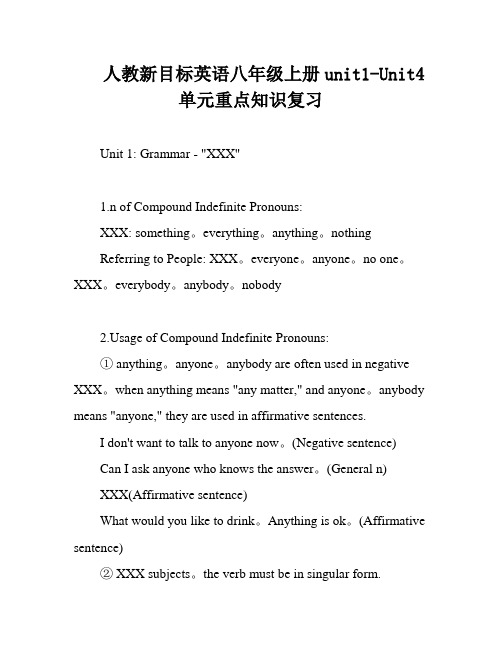
人教新目标英语八年级上册unit1-Unit4单元重点知识复习Unit 1: Grammar - "XXX"1.n of Compound Indefinite Pronouns:XXX: something。
everything。
anything。
nothingReferring to People: XXX。
everyone。
anyone。
no one。
XXX。
everybody。
anybody。
nobodyage of Compound Indefinite Pronouns:① anything。
anyone。
anybody are often used in negative XXX。
when anything means "any matter," and anyone。
anybody means "anyone," they are used in affirmative sentences.I don't want to talk to anyone now。
(Negative sentence)Can I ask anyone who knows the answer。
(General n)XXX(Affirmative sentence)What would you like to drink。
Anything is ok。
(Affirmative sentence)② XXX subjects。
the verb must be in singular form.Everyone here is from China.XXX.③ Adjectives XXX.Would you like to buy anything special?Can XXX interesting?④ When making requests。
新目标英语八年级上册Unit 1知识点汇总

新目标英语八年级上册Unit 1知识点汇总新目标英语八年级上册Unit 1知识点汇总新目标英语八年级上册全部知识点U☆ 句子问频率How often do you exercise?a day.2. What dusually do on weekends?usually watches TVHow many hours do you sleep?Nine hou☆ 核心知识表频率副词:always, usuallardly ever, never2. once a week 一周一次,twice a year 一年两次a week 一周三次ua month 一个月四次allbe good/ doing sth. 对什么有益be bad/ doing sth. 对什么有害want to do sth. 想要做某事want sb. to do sth. 要某人做某事as for 至于do sth. 尽量做某事uainly = sure 当然look aake care of 照顾10althy=stay healthy 保持健康xake exd锻炼12. although = though 虽然be the same as 与什么相同be d不同w often 多久一次ududget good grades 取得好成绩advice 中的 advice 是不可数名词/ be ingood health 保持健康gg = dg 购物20. su上网21. a llots of 许多22. healalthy adalthily adv., unhealthy adj.23. dadj. d可数☆ 熟读P1 1b , P 2 2a G.F, P3 3, P5 3a 3b。
人教版新目标八年级英语上册第一单元知识详解

Can youlook aftermy baby when I leave?
Pleaselook afteryour own bags carefully.
look还可以和许多词搭配,但意思不一样。
(1)look at“看,认真地看”。e.g.
Pleaselook atthe blackboard.
Some people arelooking atthe notice.
(2)look for“寻找”。e.g.
Old Henrylooked forhis dogs, but he didn’t find it.
I’mlooking formy lost pen.
8.Good food and exercise help me to study better.好的饮食和锻炼帮助我学得更好。
1.pretty表示“十分”作副词用,我们以前学过quite和very也有这种意思。其中它们的程度由浅入深为quite→pretty→very.e.g.
He isquiteserious.
It soundsprettygood.
Nina can sing English songsverywell.
我们已经学习了always, usually, often, sometimes, never等表示时间频度的副词。这些词通常用来说明在一段时间内做某事的多少或某种状态存在的次数的多少。例如:
We usually get up at half past six.我们通常六点半起床。
Sometimes he goes to see his grandpa on weekends.周末,他有时候去看望爷爷。
人教新目标八年级英语上册Unit1Wheredidyougoonvacation知识点讲解
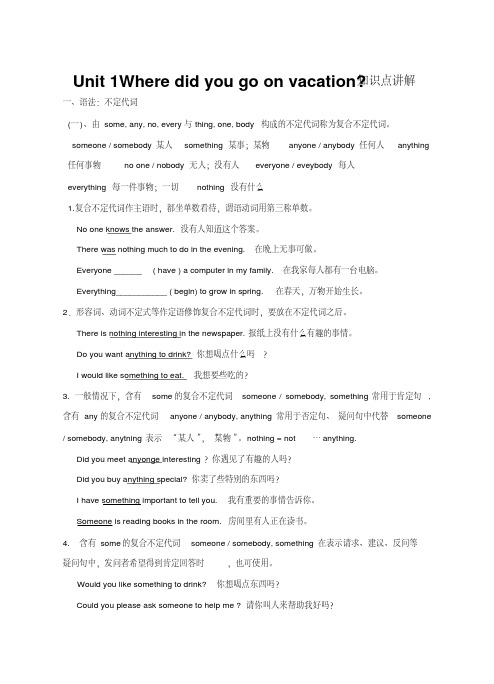
Unit 1Where did you go on vacation?知识点讲解一、语法:不定代词(一)、由some, any, no, every与thing, one, body 构成的不定代词称为复合不定代词。
someone / somebody 某人something 某事;某物anyone / anybody 任何人anything 任何事物no one / nobody 无人;没有人everyone / eveybody 每人everything 每一件事物;一切nothing 没有什么1.复合不定代词作主语时,都坐单数看待,谓语动词用第三称单数。
No one knows the answer. 没有人知道这个答案。
There was nothing much to do in the evening. 在晚上无事可做。
Everyone ______ ( have ) a computer in my family. 在我家每人都有一台电脑。
Everything___________ ( begin) to grow in spring. 在春天,万物开始生长。
2.形容词、动词不定式等作定语修饰复合不定代词时,要放在不定代词之后。
There is nothing interesting in the newspaper.报纸上没有什么有趣的事情。
Do you want anything to drink?你想喝点什么吗?I would like something to eat. 我想要些吃的?3. 一般情况下,含有some的复合不定代词someone / somebody, something常用于肯定句,含有any的复合不定代词anyone / anybody, anything常用于否定句、疑问句中代替someone / somebody, anytning表示“ 某人”,“某物”。
新目标英语八年级上册U1-u2知识点
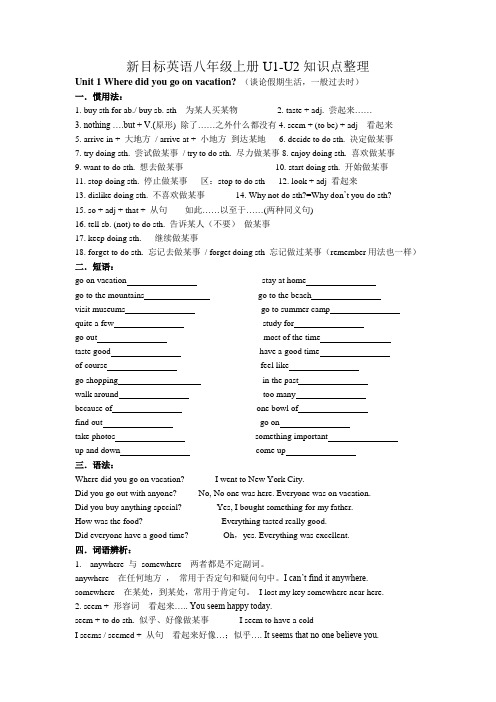
新目标英语八年级上册U1-U2知识点整理Unit 1 Where did you go on vacation?(谈论假期生活,一般过去时)一.惯用法:1. buy sth for ab./ buy sb. sth 为某人买某物2. taste + adj. 尝起来……3. nothing ….but + V.(原形) 除了……之外什么都没有4. seem + (to be) + adj 看起来5. arrive in + 大地方/ arrive at + 小地方到达某地6. decide to do sth. 决定做某事7. try doing sth. 尝试做某事/ try to do sth. 尽力做某事8. enjoy doing sth. 喜欢做某事9. want to do sth. 想去做某事10. start doing sth. 开始做某事11. stop doing sth. 停止做某事区:stop to do sth 12. look + adj 看起来13. dislike doing sth. 不喜欢做某事14. Why not do sth?=Why don’t you do sth?15. so + adj + that + 从句如此……以至于……(两种同义句)16. tell sb. (not) to do sth. 告诉某人(不要)做某事17. keep doing sth. 继续做某事seem like ….好像,似乎….. It seems like a god idea.3. decide to do sth.决定做某事They decide to visit the museum.4. start doing sth = start to do sth. 开始,可与begin 互换5. over 介词,多于,超过,在…以上(表示数目、程度)= more thanMy father is over 40 years old.6. too many 太多,后接可数名词复数:Mother bought too many eggs yesterday.too much 太多,修饰不可数名词,修饰动词作状语。
新版新目标英语八年级上册知识点总结

U n i t1W h e r e d i d y o u g o o n v a c a t i o n1.go on vacation去度假vacation假期、假日=holiday,on vacation = on holiday 度假the long vacation 长假the summer vacation 暑假 the Christmas vacation 圣诞假期goonvacation/tothemountains/tothebeach/tosummercamp 去度假,去爬山,去沙滩,去夏令营2.buy anything special 买特别的东西1buy v买;购买过去式为bought buysb.sth=buysthforsb. 给某人买某物2anything不定代词,某事;某件东西主要用于疑问句或否定句中Do you want to buy anything for meI can’t say anything about it.3)anthing special特别的东西 adj修饰不定代词时后置4 something,anything,nothing,everything是指物的不定代词;somebody,someone,anybody,anyone, nobody,everybody,everyone是指人的不定代词;somewhere,anywhere,nowhere,everywhere是指地点的不定代词;5 这些不定代词做主语时,谓语动词用第三人称单数 Is everybody here 大家都到齐了吗6 something,somebody,someone,somewhere用于肯定句及表示请求或建议的疑问句中,而anything, anybody,anyone,anywhere用于否定句及疑问句中;Did you do anything interesting 你做了有趣的事吗表疑问3. anywhere adv 在任何地方 Did you go anywhere during the summer vacationanywhere 在任何地方常用于否定句和疑问句中I can’t find it anywhere.somewhere 在某处;到某处常用于肯定句中 I lost my key somewhere near here.4.take photos 照相;拍照5. quite a few 很多;不少修饰可数名词复数quite a little 很多;不少修饰不可数名词afew+可数名词复数表肯定 few+可数名词复数表否定alittle+不数名词表肯定 little+不可数名词表否定6.most of the time大部分时间 most为代词,大部分;大多数most of………中的大多数它作主语时,谓语动词取决于most of后所修饰的名词Most of us are going to the park. 我们大多数人要去公园;Most of the food goes bad. 大部分的食物都变质了;7.have a good time = enjoy oneself = have fun 玩得开心 + doingWe had a good time visiting the the Great Wall.= We enjoyed ourselves visiting the the Great Wall.= We had fun visiting the the Great Wall.8.How did you like it 你觉得它怎么样How do/did you like……你觉得……怎么样用来询问对方的观点或看法,=What do you think of……=How do/did you feel about……9. go shopping去购物;去买东西=do some shopping.go+doing 形式表示去做某事,常用于表达从事某一体育活动或休闲活动go skating 去滑冰 go hiking 去徒步旅行 go sightseeing 去观光go fishing去钓鱼 go swimming 去游泳 go boating 去划船10.a friend’s farm是名词所有格形式;一般情况下,表示“有生命的人或物”的名词后面加’s,表示所属关系;The red bike is Alice’s.那辆红色的自行车是爱丽斯的;名词所有格的构成:1单数名词词尾加’s ,复数名词词尾没有s,也要加’sthe girl ‘s pen女孩的钢笔women’s shoes女鞋on Children’s Day2复数名词以s结尾的只加’the students’ reading room学生阅览室Teachers’ Day教师节3如果两个名词并列,并且分别有’s,则表示“分别有”;只后一个名词有一个’s,则表示“共有”:John’s and Kate’s rooms.约翰和凯特各自的房间;Lily and Lucy’s father. 莉莉和露西的爸爸同一个爸爸;4表示无生命的名词一般以...of...构成短语,表示所有关系;a map of China一幅中国地图 the name of the story那个故事的名字11.seem v 好像;似乎;看来1seem+adj. 看起来…… You seem happy today.你今天看起来很高兴;2seem+to do sth. 似乎,好像做某事I seem to have a cold.我似乎感冒了;=It seems that I have a cold.3)It seems/seemed+从句看起来好像…;似乎…It seems that no one believes you.看起来好像没有人相信你4 seem like 好像,似乎12.nothing much to do 没什么事可做nothing...but... 除....之外什么也没有,只有 but+ n/v原形I have nothing to do but watch TV.Thereisnothingmuchtodobutread.除了读书没什么可做的13. bored boringbored 厌烦的;感到无聊的一般在句中修饰人boring 无聊的;令人厌烦的一般在句中修饰事或物beboredwith对…感到无聊interested adj. 感兴趣的 interesting adj. 有趣的 surprised adj. 感到惊奇的surprising adj. 惊奇的tired 累的 tiring 令人疲惫的 excited 兴奋的 exciting 令人兴奋/激动的amazed 惊讶的 amazing 令人惊讶的14.say about 发表对....的看法enjoyable adj 愉快的;快乐的 enjoy doing sth . 喜欢做…乐意做…enjoy oneself =have a good = have fun 过得愉快15.arrive v 到达 arrive in表示到达较大的地方,如国家、省、市等arrive at表示到达较小的地方,如机场、商店、广场、村庄等;地点副词home,here,there前介词省略arrive in+大地点 / arrive at+小地点②get to +地点③reach+地点16.decide v 决定 n decisiondecide to do sth. 决定做某事 decide not to do sth决定不要做某事decide on doing sth. 决定做某事make a decision to do sth.decidetodosth=makeadecisiontodosth决定做某事decide后常跟疑问词+动词不定式做宾语17.try v 其后常接名词、动名词或不定式,尝试;试图,设法;努力1trytodosth努力做…表示想尽一切办法要把事情办成,强调付出努力设法去完成;2trydoingsth尝试做表示一种尝试、做做看的想法,不一定付出很多努力;3try/doone’sbesttodo尽力做4haveatry试一试 try n 尝试18.feel like给……的感觉;感受到其后常接从句;He feels like he is swimming. 他感觉像在游泳一样;feel like 想要……其后可接名词、代词或动名词;feel like sth. 想要某物 feel like doing sth. 想要做某事19. building n 建筑物;楼房build v建造,建筑built,built,The workers built many tall buildings in our school last year.20.wonder v 想知道;琢磨其后常接who, what, why等疑问词引导的宾语从句;I wonder what they were doing here.我想知道他去哪里了;21.walk around 四处走走He’s just walking around the village.他只是在村庄里随便走走;22.difference n 差别,差异 adj different不同的;有差异的What is the difference between this book and that book My schoolbag is different from yours.1tellthedifferencesbe tween..and…说出…与…的区别2makeadifferenceto对…有影响,有意义3 be different from 与……不同 be the same as23. 常用的感叹句的结构:1What +adj.+ 复数名词 / 不可数名词+主语+谓语2What +a/an+adj.+可数名词单数+主语+谓语3How +adj. +a/an+可数名词单数+主语+谓语4How+adj./adv. +主语+谓语What an interesting book it is = How interesting a book is 那本书多么有趣啊24. want to do sth. =想要做某事 start doing sth. 开始做某事=start to do sth.take the train 乘火车”,take乘坐25.a little 一点儿修饰动词、形容词或副词;也可修饰不可数名词;26. wait for等候其后可接人或物Tom was waiting for a bus over there.27. over prep多于;超过=more than;My father is over 40 years old.There are over eight hundred students in our school.28. too many 太多其后接可数名词复数; He always has too many questions to ask me.too many + 可数名词复数太多...too much + 不可数名词太多...much too + 形容词 /副词太...29. becauseof+宾语名词/动名词/代词因为,由于becauseconj.+句子因为引导状语从句I didn’t buy the shirt because it was too expensive.He lost his job because of his age.30. below 表示下方,低于反义词为 above 在......上面under表示在正下方31. bring 带来;拿来指从别处带到说话者所在地take 拿走;带走指从说话者所在地带到别处去bring sth.to +地点,带来其反义词是takePlease bring your book to our school. 请把你的书带到我们学校来;Please take your book to your school. 请把你的书带到你的学校去;32.enough adj 足够的,充分的修饰adj或adv,一般置于被修饰词之后1enough+n足够多的用来修饰名词时放在名词之前2adj/advenoughtodosth足够…We have enough time to do our homework. The box is big enough.33. forget to do sth.与forget doing sth.forget to do sth. 忘记要做某事事情还没做Don’t forget to close the window.forget doing sth. 意为“忘记做过某事事情已经做过了 I forget closing the window.stoptodo停下来去做另外一件事,stopdoing停下来做某事34.why not为什么不呢一般用在疑问句中,表示提建议;why not后面需跟动词原形;Why not + 动词原形 =Why don’t you+ 动词原形Why not go to the party with me =Why don’t you go to the party with me提建议的句子What/ how about +doing sth. Why don’t you + do sth. Why not + do sth.Let’s + do sth. Shall we/ I + do sth.35. with prep 具有;带有with作介词时的其他用法1“和……一起’ I often go to school ______ my friend. 我经常和朋友们一起去上学;2以手段、材料,用工具, Cut the apple with a knife. 用刀切苹果;36.s o … that 如此…以致于引导结果状语从句,so adv+adj/adv. that+从句She was so sad that she couldn’t say a word. 她悲伤得一句话也说不出来;so that 引导目的状语从句以便,为了so…that…/ such…that…如此…以致引导的结果状语从句so+adj./adv.+that…He is ____lovely a boy____we love him very much.The little boy is so young that he can’t go to school.37. tell sb not to do sth. 告诉某人不要做某事keep doing sth. 继续做某事,一直做某事38. jump up and down in excitement. 兴奋地蹦上蹦下up and down 上上下下;来来回回在句中作状语;They looked me ______ ______ ______. 他们上上下下打量我;He walks______ ______ ______ in the room. 他在房间里来回走动;jump into 跳入 jump off 跳离 jump over 跳过 jump out of 跳出39. comeup太阳出来;出现,发生40. 反身代词:myself , ourselves, yourself , yourselves, himself, herself, itself, themselves.作动词或介词的宾语:经常在enjoy, teach, hurt, buy, introduce, dress, kill等动词和by, for, to, of等介词后作宾语;一年主考宾语回自身He is teaching himself English.她在自学英语;talk to oneself自言自语 live by oneself独自住 Help yourself 请随便吃吧/请自己去取吧Make yourself at home 别客气 make yourself heard /understood. 使你的话被人听得见/理解 teach oneself 自学=learn by oneself by oneself 独自for oneself 为自己;替自己 enjoy oneself 玩的愉快 dress oneself 给自己穿衣41. onthetopof在…的上面 takeanumbrellawithsth随身携带一把伞longtimenosee好久不见 inthecountryside在农村keepadiary记日记 enjoydoing享受做… walkuptosp.往上走到某地rideabiketosp.=gotosp.onthebike=gotosp.bybike骑自行车去某地rainhard/heavily雨下得大 abowof一碗42. taste good 尝起来好吃系动词+adjkeep保持stay保持seem好像look看来像smell闻起来sound听起来taste尝起来feel摸起来。
最新人教新目标英语八年级上册 Unit 1 Where did you go on vacation?单元知识归纳

Unit 1 Where did you go on vacation?单元知识目标突破词汇SectionAanyone pron.任何人→P3SectionBfeel like给……的感觉;感受到→P10quite a few 相当多;不少→P3building n.建筑物;房子→P10wonder v. 想知道;琢磨→P11most adj.,adv. &pron. 最多;大多数→P4difference n.差别;差异→P11wait v.&n. 等待;等候→P12 seem v. 好像;似乎;看来→P4because of 因为→P12bored adj. 厌倦的;烦闷的→P5below prep.&adv. 在……下面;到……下面→P13SectionBactivity n. 活动→P9enough adj. 足够的;充足的;充分的→P13 decide v. 决定;选定→P9try v.& n. 尝试;设法;努力→P9dislike v.&n.不喜爱;厌恶→P14把握句型1.I felt like I was a bird.我感觉像是一只鸟。
feel like后接的是宾语从句。
2.I wonder what life was likehere in the past.我很想知道过去这儿的生活是什么样的。
注意wonder的用法。
3.What a difference a day makes!一天的差别有多大!注意感叹句。
4.And because of the badweather,we couldn't seeanything below.因为这恶劣天气,我们看不到下面的任何景色。
注意because of的运用。
熟悉语法学习不定代词的用法。
规则动词和不规则动词的过去式。
学会交际学会询问度假情况的交际用语。
写作练笔记叙假期发生的事情。
课文翻译Section A 2dRick:Hi,Helen. Long time no see.Helen:Hi,Rick. Yes,I was on vacation last month.Rick:Oh,did you go anywhere interesting?Helen:Yes,I went to Guizhou with my family.Rick:Wow!Did you see Huangguoshu Waterfall?Helen:Yes,I did. It was wonderful!①We took quite a few photos there. What about you?Did you do anything special last month?Rick:Not really.②I just stayed at home most of the time to read and relax.,里克:你好,海伦。
八年级英语上册第一、二单元知识点总结(新目标版英语)
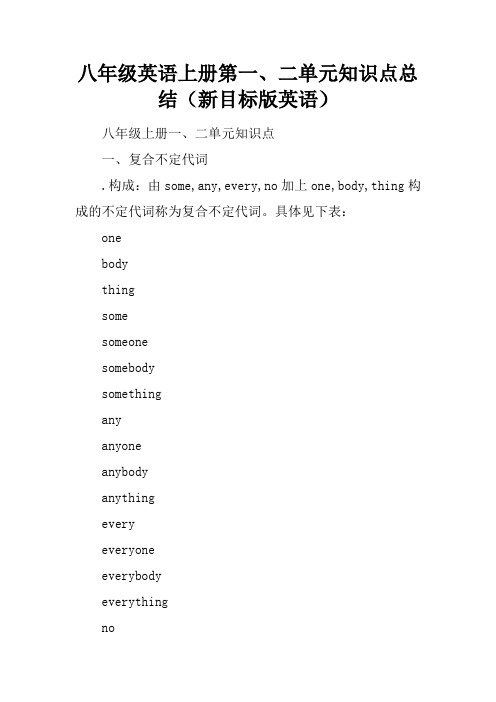
八年级英语上册第一、二单元知识点总结(新目标版英语)八年级上册一、二单元知识点一、复合不定代词.构成:由some,any,every,no加上one,body,thing构成的不定代词称为复合不定代词。
具体见下表:onebodythingsomesomeonesomebodysomethinganyanyoneanybodyanythingeveryeveryoneeverybodyeverythingnonoonenobodynothing2.用法:(1)复合不定代词被形容词、动词、不定式等修饰时,要放在它们的后面。
Ihavesomethingimportanttotellyou.我有重要的事情要告诉你。
Thereisnothingwrongwiththeradio.这个收音机没有毛病。
Doyouwantanythingtodrink?你想喝点什么吗?(2)复合不定代词作主语时,谓语动词用单数形式。
Everythingbeginstogrowinspring.春天万物开始生长。
Someoneiswaitingforyouatthedoor.有人在门口等你。
(3)肯定句中用含some,疑问句和否定句中用含any。
但在表示请求、建议、反问等的疑问句中,常用含有some 的不定代词。
wouldyoulikesomethingtoeat?你想要些吃的东西吗?(4)anyone,anything也可以用在肯定句中,前者表示“任何人”,后者表示“任何事”。
Anyonecandothis.任何人都会做这个。
Icananythingforyou.我能为你做任何事。
3.goonvacation“去度假”;vacation同义词为holiday,意为“假期”。
beonvacation“在度假”。
IwanttogoonvacationinHainanthiswinter.今年冬天我想去海南度假。
Theyareonvacationattheseaside.他们正在海边度假。
人教新目标英语八年级上册 Unit 1 sectionA语法知识点总结

人教新目标英语八年级上册Unit 1 sectionA语法知识点总结Unit 1 Where did you go on vacation?一般过去时态的概念:1.表示过去某时间发生的动作或存在的状态。
2.表示过去经常性习惯性的动作。
一般过去时常用的标志词有:yesterday,the day before yesterday,last week/month/year, just now, …ago,in+过去时间…一.用Be动词的一般过去时(1)肯定句式:主语+ was / were + 其它.(2)否定句式:主语+ wasn’t /weren’t+ 其它.(3)一般疑问句:Was/Were + 主语+ 其它?肯定回答:Yes,主语+ was / were .否定回答:No,主语+ wasn’t /weren’t.(4)特殊疑问词+was/were+主语+其他?肯定句:The air was clean yesterday.否定句:The air wasn't clean yesterday.一般疑问句:Was the air clean yesterday?肯定回答:Yes, it was.否定回答:No, it wasn't.特殊疑问句:How was the air yesterday?二.行为动词(v.)的一般过去时态(1)肯定句式:主语+ v-ed+ 其它.【do , does---did】(2)否定句式:主语+ didn’t + v原形+ 其它. 【did not = didn’t】(3)一般疑问句:Did + 主语+ v原形+ 其它?肯定回答:Yes,主语+did.否定回答:No,主语+did’t.(4)特殊疑问词+did+主语+v.原形+其他?肯定句:I rode a horse last Sunday.否定句:I didn‘t ride a horse last Sunday.一般疑问句:Did you ride a horse last Sunday? 肯定回答:Yes, I did.否定回答:No, I didn't.特殊疑问句:(1)What did you do last Sunday?(2)When did you ride a horse?三、动词过去式的构成1. 规则动词的过去式1) 一般情况下,在动词原形后面加-ed。
人教新目标英语八年级上册unit1-Unit4单元重点知识复习
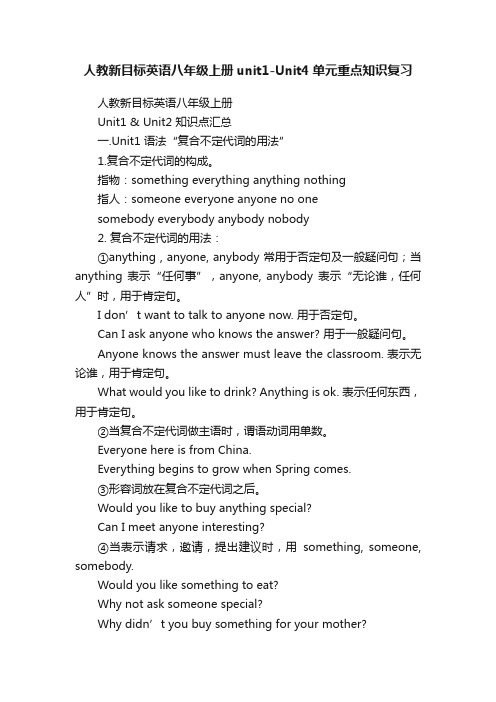
人教新目标英语八年级上册unit1-Unit4单元重点知识复习人教新目标英语八年级上册Unit1 & Unit2 知识点汇总一.Unit1 语法“复合不定代词的用法”1.复合不定代词的构成。
指物:something everything anything nothing指人:someone everyone anyone no onesomebody everybody anybody nobody2. 复合不定代词的用法:①anything , anyone, anybody 常用于否定句及一般疑问句;当anything 表示“任何事”,anyone, anybody 表示“无论谁,任何人”时,用于肯定句。
I don’t want to talk to anyone now. 用于否定句。
Can I ask anyone who knows the answer? 用于一般疑问句。
Anyone knows the answer must leave the classroom. 表示无论谁,用于肯定句。
What would you like to drink? Anything is ok. 表示任何东西,用于肯定句。
②当复合不定代词做主语时,谓语动词用单数。
Everyone here is from China.Everything begins to grow when Spring comes.③形容词放在复合不定代词之后。
Would you like to buy anything special?Can I meet anyone interesting?④当表示请求,邀请,提出建议时,用something, someone, somebody.Would you like something to eat?Why not ask someone special?Why didn’t you buy something for your mother?Unit2 语法“频率副词”How often 常用于对频率的提问,意为“多长时间一次”,其答语可以是once/ twice / three times a week; always/ usually/ often/ sometimes/ hardly ever/ never 等表示时间频率的副词及短语。
(完整版)八年级英语上册1-4单元知识点总结
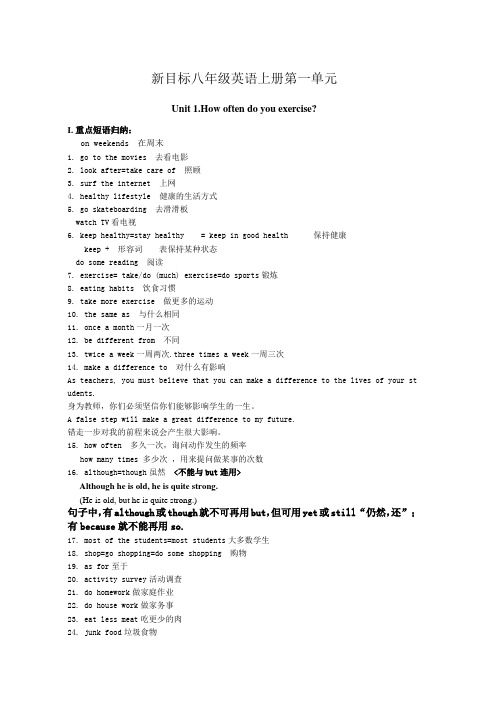
新目标八年级英语上册第一单元Unit 1.How often do you exercise?I. 重点短语归纳:on weekends 在周末1. go to the movies 去看电影2. look after=take care of 照顾3. surf the internet 上网4. healthy lifestyle 健康的生活方式5. go skateboarding 去滑滑板watch TV看电视6. keep healthy=stay healthy = keep in good health 保持健康keep + 形容词表保持某种状态do some reading 阅读7. exercise= take/do (much) exercise=do sports锻炼8. eating habits 饮食习惯9. take more exercise 做更多的运动10. the same as 与什么相同11. once a month一月一次12. be different from 不同13. twice a week一周两次.three times a week一周三次14. make a difference to 对什么有影响As teachers, you must believe that you can make a difference to the lives of your st udents.身为教师,你们必须坚信你们能够影响学生的一生。
A false step will make a great difference to my future.错走一步对我的前程来说会产生很大影响。
15. how often 多久一次,询问动作发生的频率how many times 多少次,用来提问做某事的次数16. although=though虽然<不能与but连用>Although he is old, he is quite strong.(He is old, but he is quite strong.)句子中,有although或though就不可再用but,但可用yet或still“仍然,还”;有because就不能再用so.17. most of the students=most students大多数学生18. shop=go shopping=do some shopping 购物19. as for至于20. activity survey活动调查21. do homework做家庭作业22. do house work做家务事23. eat less meat吃更少的肉24. junk food垃圾食物25. be good for 对什么有益26. be bad for对什么有害27. want to do sth 想做某事28. want sb to do sth想某人做某事29. try to do sth 尽量做某事30. come home from school放学回家31. of course=certainly=sure当然32. get good grades取得好成绩33. some advice 一些建议some advice 中的advice 是不可数名词 a piece of advice 一则建议 give advice 提出建议take one’s advice 采纳或听从某人的建议4. help sb to do sth帮助某人做某事=help sb with sth35. a lot of vegetables=many vegetables许多蔬菜36. hardly= almost not几乎不hardly ever很少,几乎不,从不37. keep/be in good health保持健康38.your favorite program你最喜欢的节目39. Animal World 动物世界40. play soccer踢足球41.every day 每天every day 与everyday1. every day 作状语,译为“每一天”。
人教新目标英语八年级上册Unit1知识讲解+练习题(含答案)

exciting令人兴奋的interesting令人感兴趣的moving令人感动的
人教新目标英语八年级上册
Unit1Where did you go on vacation?
词句精讲精练
撰稿人:审稿人:
词汇精讲
1. anywhere
anywhere是副词,意为“在任何地方”,常用在否定句或疑问句中,而在肯定句中,则多用somewhere。例如:
He can’t find his English book anywhere.他到处找不到他的英语书。
(2) try one’s best to do sth.意为“尽某人最大努力做某事”。例如:
We should try our best to finish the work on time.我们应该尽最大努力准时完成这项工作。
(3)try构成的短语:
try sth.on试穿
try out sth.试验、检验
4. decide to do sth. ________________________
5.足够大________________________
6.尝试做某事________________________
7. buy sth. for sb. ________________________
8.看起来漂亮________________________
5. His talk made us feel b________________, so we wanted to go home.
- 1、下载文档前请自行甄别文档内容的完整性,平台不提供额外的编辑、内容补充、找答案等附加服务。
- 2、"仅部分预览"的文档,不可在线预览部分如存在完整性等问题,可反馈申请退款(可完整预览的文档不适用该条件!)。
- 3、如文档侵犯您的权益,请联系客服反馈,我们会尽快为您处理(人工客服工作时间:9:00-18:30)。
Unit 1 How often do you exercise?1. 疑问词 how 的用法(1) 怎样,用什么手段,方法/交通工具How are you? / How is she?How did he do it? / I don't know how to swim.How do you come to school?(2) 情况如何(指身体健康状况) How are you?(3) how many,how much 表示"多少"其中how much 还可以表示钱数。
how many 后接可数名词复数,how much 接不可数名词。
How many times do you go to the park?How many pens do you want?How much water do we drink every day?How much are those pants?(4) how often 是对动作发生的“次数”提问,询问的是频率“多久一次”回答可以是:Every day. / Once a week. / Three times a week. / Often. / …How often do you play tennis?How often do you surf the Internet?(5) How old …? 询问年龄 How old are you? I am five.(6) How about …? ……如何?……怎么样? How about going to the movies?2. time 表示不可数名词,意为“时间”。
表示可数名词,意为“次数,倍数”What time is it?I go to the movies three times a week.注意“次数”的表达方法一次 once,两次 twice,三次或三次以上用基数词加上 times:three times, five times, one hundred times表示“……几次”的表达方法是:once a day/ a week/ a month/ a yeartwice a day/ a week/ a month/ a year2. exercise v./ n. shop v./ n.He often exercises on weekends.We often do / take exercise on weekends. We often shop on weekends.There are many shops in the neighborhood.4. as for 意为“就……而论;至于”As for fruit,I eat it sometimes.As for him,I never want to see him here.至于他,我永远不希望在这里见到。
5. My mother wants me to drink it.我妈妈想要我喝。
want to do sth. 想要做某事want sb. to do sth. 想要某人干某事Do you want to go to the movies with me?你想和我一起去看电影吗?I want you to help me with my math.我想要你帮我学数学。
有很多动词后面用这种结构做动词的复合宾语: ask sb. to do sth. 叫某人做某事tell sb. to do sth. 告诉某人去做某事help sb. (to) do sth. 帮助某人做某事6. She says it's good for my health.她说它对我的健康有意。
be good for … 表示“对……有益(有好处)”其反义为:be bad for … 对……有害/无益It's good for us to do more reading.多读书对我们有好处。
Drinking milk is good for your health.喝牛奶对你的健康有益。
Reading English is good for studying English.对英语对学习英语有益/有帮助。
Reading in bed is bad for your eyes.在床上读书对你的眼睛有害。
7. usually when I come home from school通常是在我从学校回家时When + 从句当……时候I often stay at home when it is rainy.8. I try to eat a lot of vegetables. try to do sth. 尽量/尽力做某事 I'll try to learn English well. 我会尽量尝试学好英语的。
You must try to take more exercise. 你必须尽量多做运动。
9. I look after my health. look after 照顾My brother is ill. I have to look after him today.我的弟弟病了。
我今天不得不照顾他。
All the students must look after the desks and chairs.有的学生必须照看好课桌椅。
He often helps his mother look after his little sister.他经常帮助他的妈妈照顾他的小弟弟。
10. My healthy lifestyle helps me get good grades.我健康的生活方式帮助我取得好的成绩。
help sb.(to) do sth. 帮助某人做某事She often helps me learn math. 她经常帮助我学数学。
11. Good food and exercise help me to study better.好的食物和运动帮助我学习得更好。
help sb. (to) do sth. 帮助某人做某事12. Is her lifestyle the same as yours or different?= Is her lifestyle the same as your lifestyle or is her lifestyle different from your lifestyle?她的生活方式和你的一样或是不同?be the same as … / be different from … 与……一样/与……不同She looks the same as her sister. 她看起来跟她的妹妹很像。
This book is different from that one. 这本书跟那本书不一样。
13. I think I'm kind of unhealthy. 我想我有点不健康。
kind of = a little a kind of 一种14. maybe (adv.) = perhaps 也许,可能 Maybe he knows the answer.Maybe they'll go skateboarding. He may know the answer.15. although = though 虽然 Although he's ill, he goes to school on time.虽然他生病了,但他还是准时上学。
She eats a lot of chocolate, although she is very fat.虽然她很胖,但她却吃许多的巧克力。
16. A lot of vegetables help you to keep in good health.A lot of = lots of = many/ much 许多keep in good health = keep healthy = stay healthykeep + 形容词表保持某种状态Keep quiet! The baby is sleeping.那婴儿正在睡觉,保持安静!We must keep our classroom clean.我们必须保持我们的教室干净。
17. 注意 sometimes 与几个形似的词的区别。
(1) sometime 是副词,意为“在某个时候;某时”Will you come again sometime next week?下周的某个时候你会再来吗?She was there sometime last year.她去年某时去过那。
(2) some time 是名词词组,意为“一段时间”,做时间状语用I will stay here for some time.我将在这呆一段时间。
He worked for that company for some time.他为那家电脑公司工作了一阵子。
(3) some times 是名词词组,意为“几次,几倍”I met him some times in the street last month.上个月我在街上遇到他好几次了。
The factory is some times larger than that one.这间工厂比那间大好几倍。
(4) sometimes 是频度副词,意为“有时”He sometimes goes skateboarding on weekends.他有时周末去滑滑板。
18. That sounds interesting. 那听起来有趣。
look(看起来),sound(听起来),smell(闻起来),taste(尝起来),feel (觉得),seem(好象),grow(变得) , get(变得)等词在英语中可用作系动词,后跟形容词作表语。
It tastes good. 这味道好。
The music sounds very sweet.这音乐听起来很入耳。
